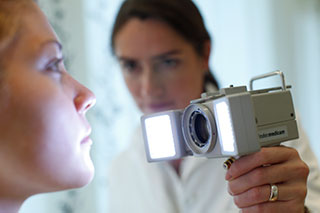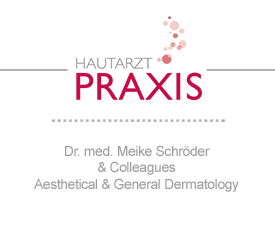General dermatology

Our dermatological efforts include the diagnosis and the therapy of the whole spectrum of the classical dermatology.
The spectrum of dermatological diseases is very widespread, over 3000 different clinical pictures are part of it, and some, like the allergic affections and the skin cancer diseases record a constant increase of incidence. This also manifested in an increase of the ambulant interventions in our practice within the last 10 years.
The psoriasis
The psoriasis is a quite common disease of the skin. About 2-3 % of the german population are affected by the psoriasis. The triggering causes are not completely investigated yet. Scientifically confirmed is the fact, that the disposition to psoriasis is inherited. However the genetic endowment is not enough to contract the psoriasis. More factors, like external influences (lesions, pressure) and/or internal factors (psyche, stress, alcohol, drugs) are needed to manifest the disease. Also infectious diseases, metabolic disorders, hormonal factors and other environmental influences can have a triggering effect.
In most cases the symptoms are externally treated, only in severe cases an internal treatment is necessary.
For the external therapy, ointments with vitamin-D3-derivates and corticosteroids are preferred. They inhibit the inflammation, respectively the generation of callus flakes.
For the skin care urea ointments are very suitable.
The neurodermatitis
The neurodermatitis, also called endogenetic eczema or atopic dermatitis, develops in the context of an inherent hypersensitivity of the skin. Most of the patients evolve skin variations already while childhood. The reasons of the neurodermatitis are very diverse. An important factor is the inherited predisposition for the development of the disease.
Finally, the exact mechanism of the disease is not clarified, the „multifactorial“ influence is different for every patient. At least 3% of the german population suffer from an atopic eczema. Different factors like allergies, unspecific allures, infects or mental pressure can lead to the outbreak of the disease.
Many patients with neurodermatitis suffer from allergies. For proven allergies, the allergens should be avoided and contra allergic measures should be taken (e.g. a reasonable adjustment of the nutrition, special duvet covers, special underwear with silver, avoidance of animal hair).
At the treatment of the neurodermatitis, so called lipid regulating measures for the prevention of new episodes are an important basic therapy. At an acute episode, anti-inflammatory ointments and drugs against itching are applied. At severe progressions, a change of climate can be very useful.
The rosacea
The rosacea is a chronic disease of the skin while adulthood, which in the vernacular is also described as copper fin.
What is the course of a rosacea?
The rosacea often starts with a facial erythrosis, i.e. a permanent relaxation of the vessels in the area of the cheeks, nose and forehead. This appears as a quite reddened skin, many patients also suffer from a sudden reddening of the skin of the face, which is sensed as particular unpleasant.
n the progression, inflammatory nodules and pus-filled blains (pustules) occur. Sometimes also the eyes can be concerned in the form of a conjunctivitis or a inflammation of the eyelid-margin. At a very severe course of disease a bulb-like swelling of the nose (rhinophyma) can develop.
What are the reasons for the rosacea?
The reasons for the rosacea are not clarified yet. But we know that there are several factors which can provoke the rosacea, among them are mental stress and conflict situations, sunlight, spicy herbs or alcohol.
Which forms of therapy exist?
The therapy of the rosacea for mild forms consists of an external treatment with a metronidazole ointment or azelaic acid ointment. The facial erythrosis be treated at an early stage with the help of a vessel laser or the Flash Lamp or the flash lamp and thus a progression of the disease can be avoided. At severe forms, generally an internal antibiotic or anti-inflammatory therapy is necessary.
What auxiliary actions can be taken?
Supportively, the medical cosmetic is very important. The skin, suffering from rosacea, is very sensitive and needs a special care. The medical cosmetician can help you to find the appropriate care for your skin. Also a regular lymphatic drainage (rosacea massage after Sobey) helps to detumesce edemas and to relax the stressed skin of the face.
Further information: www.rosazeahilfe.de

